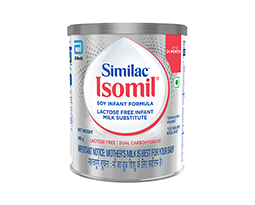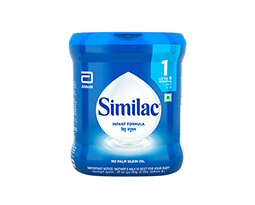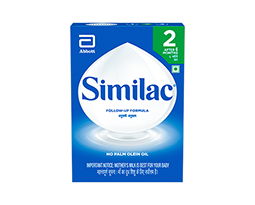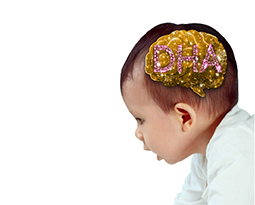Similac Advance helps in healthy growth and optimal development.
It contains a special blend of neuro nutrients including omega 3 and 6 fatty acids [precursors of DHA and ARA], choline, iron, taurine, iodine, folic acid and zinc which are required for healthy brain and eye development.
It contains a unique palm olein oil free fat blend which promotes better calcium and fatty acid absorption. It is gentle on baby's digestive system due to unique fat blend designed to promote softer stools
Similac Advance also contains Antioxidants vitamin A, C, E and Zinc that are known to support baby's developing immune system.
In addition to antioxidant vitamins, Similac Advance contains nucleotides at TPAN level similar to that of breast milk that are known to support baby's developing immune system.
SIMILAC ADVANCE Stage 2
Similac Advance Stage 2
- Product Description
-
Similac Advance Stage 2 is a scientifically formulated to meet the nutritional requirements for babies after 6 months of age. Similac Advance is a cow's milk-based, iron-fortified feeding formula with nutrient composition clinically shown to support infants' growth and development similar to that of the breastfed infants. SIMILAC ADVANCE is formulated as per standards laid down by Bureau of Indian Standards (BIS).
- Sample Available
- true
Nutrients
| Nutritional Facts-Approximate Composition | Units | Powder PER 100g | Standard Dilution* (per 100 ml) |
|---|---|---|---|
| Energy | kcal | 466 | 69 |
| kJ | 1950 | 291 | |
| Protein | g | 14.70 | 2.19 |
| Fat | g | 20.00 | 2.98 |
| Saturated fatty acids | g | 9.60 | 1.43 |
| Monounsaturated fatty acids | g | 7.07 | 1.05 |
| Polyunsaturated fatty acids | g | 4.18 | 0.62 |
| Trans fatty acids | g | 0.50 | 0.07 |
| Cholesterol | mg | 21 | 3.13 |
| Linoleic acid (Omega6) | mg | 2280 | 340 |
| Alpha-Linoleic acid (Omega3) | mg | 285 | 42 |
| Carbohydrate | g | 56.81 | 8.47 |
| Total sugars | g | 47.00 | 7.01 |
| Added sugars | g | 30.74 | 4.58 |
| Taurine | mg | 40.0 | 6.0 |
| Nucleotide equivalents | mg | 48.0 | 7.2 |
| VITAMINS** | |||
| Vitamin A | IU | 1419 | 212 |
| mcg RE | 426 | 64 | |
| Vitamin D2 | IU | 292 | 44 |
| mcg | 7.30 | 1.09 | |
| Vitamin E | IU | 12.8 | 1.9 |
| mg alpha-TE | 8.6 | 1.3 | |
| Vitamin K | mcg | 34.0 | 5.1 |
| Vitamin C | mg | 70.0 | 10.4 |
| Folic Acid | mcg | 100 | 15 |
| Vitamin B1 (Thiamin) | mg | 0.42 | 0.06 |
| Vitamin B2 (Riboflavin) | mg | 0.75 | 0.11 |
| Vitamin B6 (Pyridoxine) | mg | 0.32 | 0.05 |
| Vitamin B12 | mcg | 1.30 | 0.19 |
| Niacin | mg | 3.50 | 0.52 |
| Pantothenic Acid | mcg | 2000 | 298 |
| Biotin | mcg | 18.4 | 2.7 |
| Choline | mg | 50.0 | 7.5 |
| MINERALS# | |||
| Sodium | mg | 192 | 29 |
| Potassium | mg | 686 | 102 |
| Chloride | mg | 452 | 67 |
| Calcium | mg | 487 | 73 |
| Phosphorus | mg | 323 | 48 |
| Magnesium | mg | 46.0 | 6.9 |
| Iron | mg | 7.60 | 1.13 |
| Zinc | mg | 3.00 | 0.45 |
| Manganese | mcg | 75 | 11 |
| Copper | mcg | 400 | 60 |
| Iodine | mcg | 75.0 | 11.2 |
| Selenium | mcg | 14.4 | 2.2 |
Ingredients
Lactose, skim milk powder, edible vegetable oil (high oleic sunflower oil, soy oil, coconut oil), whey protein concentrate, maltodextrin, MINERALS#, VITAMINS**, emulsifier (soy lecithin), nucleotides, taurine, antioxidant (mixed tocopherols)
Preparation
| To Prepare One Feeding | |||
|---|---|---|---|
| Approximate age of baby | Warm (previously boiled) water, ml | No. of level scoops | No. of feedings per 24 hrs. |
| 6-12 months | 180 | 6 | 4 |
| Over 12 months | 180 | 6 | 3 |
*Standard reconstitution is one packed scoop (approximately 5.1 g) of powder for each 30 ml (1 fl oz) of water or 149.1 g of powder mixed with sufficient water to yield 1 L of product.
◊ Infants above 6 months should receive supplemental food in addition to formula. Consult your baby's physician for advice.
Storage Instructions
This box contains a sealed foil pouch. Once foil pouch has been opened, contents should be used within 2 weeks. Please do not empty the content of foil into the container and continue to use powder from foil pouch. Transfer the pouch into another clean air-tight container and store in a cool, dry & hygienic place (Do not refrigerate). For extra precaution, fold the foil pouch after every use to avoid powder exposure to environment.
Safety Precautions
- Infant food/Infant milk substitute is not the sole source of nourishment of an infant.
Careful and hygienic preparation of Infant food/Infant milk substitute is most essential for health.
Do not use fewer scoops than directed since diluted feeding will not provide adequate nutrients needed by your infant. Do not use more scoops than directed since concentrated feed will not provide the water needed by your infant.
Never use a microwave oven to prepare or warm formula, it may result in serious burns.
Infant food shall be introduced after the age of 6 months and up to the age of 2 years.
Infant food/Infant milk substitute should be used only on the advice of a health worker as to the need for its use and the proper method of its use.
Important Notice
MOTHER’S MILK IS BEST FOR THE BABY
Breastfeeding provides the best nutrition and protection from illnesses of infants. For infants, breast milk is all that is needed for the first 6 months. Breastmilk is the best and most economical food for baby. Warning / Caution: Infant milk substitute is not the sole source of nourishment of an infant. Careful and hygienic preparation of infant milk substitute is most essential for health. Lactose- free infant milk substitute should only be used in case of diarrhea due to Lactose intolerance. Lactose- free infant formula should be withdrawn, if there is no improvement in symptoms of intolerance.
Continued use of infant milk substitute should not be recommended to avoid any difficulties in reverting to breastfeeding of infants after a period of feeding by infant milk substitute. In the event of recommending infant milk substitute in addition to breastmilk or its replacement during the first 6 months, keep the costs in mind. Un-boiled water, un-boiled bottles or incorrect dilution can make a baby ill. Always advise to follow instructions exactly. Unnecessary introduction of partial bottle-feeding or other foods and drinks will have negative effect on breastfeeding.
Characteristics of breastmilk: Immediately after delivery, breastmilk is yellowish and sticky. This milk is called Colostrum, which is secreted during the first-week of delivery. Colostrum is more nutritious than mature milk because it contains more protein, more anti-infective properties, which are of great importance for the infant’s defence against dangerous neo-natal infections. It also contains higher levels of Vitamin “A”.
Advantages of breastfeeding:
(A) Breastmilk is a complete and balanced food and provides all the nutrients needed by the infant; (for the first six months of life)
(B) Breastmilk has anti-infective properties that protect the infants from infection in the early months;
(C) Breastfeeding is much cheaper than feeding infant milk substitutes as the cost of extra food needed by the mother is negligible as compared to the cost of feeding infant milk substitutes;
(D) Breastmilk is always available;
(E) Breastmilk needs no utensils or water (which might carry germs) or fuel for it’s preparation;
(F) Mothers who breastfeed usually have longer periods of infertility after child birth than non-lactators.
Management of breastfeeding, as under:
i. Breastfeeding
a.) Immediately after delivery enables the contraction of the womb and helps the mother to regain her figure quickly.
b.) Is successful when the infant suckles frequently and the mother wanting to breastfeed is confident in her ability to do so.
ii. In order to promote and support breastfeeding the mother's natural desire to breastfeed should always be encouraged by giving, where needed, practical advice and making sure that she has the support of her relatives.
iii. Adequate care for the breast and nipples should be taken during pregnancy.
iv. It is also necessary to put the infant to the breast as soon as possible after delivery.
v. Let the mother and the infant stay together after the delivery, the mother and her infant should be allowed to stay together (in hospital, this is called "rooming- in").
vi. Give the infant Colostrum as it is rich in many nutrients and its anti-infective factors protect the infants from infections during the few days of its birth.
vii. The practice of discarding Colostrum and giving sugar water, honey water, butter or other concoctions instead of Colostrum should be very strongly discouraged.
viii. Let the infants suckle on demand.
ix. Every effort should be made to breastfeed the infants whenever they cry.
x. Mother should keep her body and clothes and that of the infant always neat and clean.
Abbott Healthcare Pvt Ltd,
Floor 17th, Godrej BKC, Plot C-68, G-Block, Bandra Kurla Complex, Near MCA Club, Bandra (East), Mumbai 400051. India
This information is for healthcare professionals only.
References
1.S. D. Sonkawade et al. Annals of Phytomedicine 1(1) 9-19, 2012
2.Buck RH, Thomas DL, Winship TR, et al. Effect of dietary ribonucleotides on infant immune status. Part 2: Immune cell development. Pediatr Res. 2004 Dec;56(6):891-900.
3.Pickering LK, Granoff DM, Erickson JR, et al. Modulation of the immune system by human milk and infant formula containing nucleotides. Pediatrics. 1998 Feb;101(2):242-9.
4.Llyod B et al. Formula Tolerance in Post breastfed and Exclusively Formula-Fed Infants.Pediatrics 1999;103(1)
5.Leite et al. Calcium and fat metabolic balance, and gastrointestinal tolerance in term infants fed milk-based formulas with and without palm olein and palm kernel oils: a randomized blinded crossover study. BMC Pediatrics 2013, 13:215.
6.Nelson S et al. Absorption Of Fat And Calcium By Infants Fed Milk Based Formula Containing Palm Olein. Journal Of American College of Nutrition 1998; 17:327-332.
7.Alarcon P et al. Gastrointestinal Tolerance of a New Infant Milk Formula in Healthy Babies: An International Study Conducted in 17 Countries. Nutrition 2002;18: 484–489
RELATED PRODUCTS

Similac Isomil
Similac Isomil® is formulated specially for infant feeding needs from birth. Similac Isomil® is a soy-based milk free, lactose free spray dried infant formula, to meet the special nutritional needs of infants suffering from Diarrhea, Cow’s Milk Protein Allergy (CMPA) & lactose intolerance.

Similac Stage 1
Similac Stage 1 is a scientifically formulated to meet the nutritional requirements for babies up to 6 months of age. Similac is a cow’s milk-based, iron-fortified feeding formula with nutrient composition clinically shown to support infants’ growth and development similar to that of the breastfed infants. SIMILAC is formulated as per standards laid down by Bureau of Indian Standards (BIS).

Similac Stage 2
Similac Stage 2 is a scientifically formulated to meet the nutritional requirements for babies after 6 months of age. Similac is a cow’s milk-based, iron-fortified feeding formula with nutrient composition clinically shown to support infants’ growth and development similar to that of the breastfed infants. SIMILAC is formulated as per standards laid down by Bureau of Indian Standards (BIS).
RELATED CONTENT

Key Factors for Optimal Neural Development & Cognition
Optimal nutrition during in first two years of life is essential for supporting critical periods of fetal growth and development and for fueling infant and toddler growth (until two years of age). It is during this “golden opportunity window” that the cognitive, emotional and behavioural patterns in a child shape up.

Minimize Risk of Malabsorption in Infants with Dual Carbohydrate Formulation
Lactose malabsorption is one of the most common problems encountered in children with Diarrhea. Minimize Risk of Malabsorption in Infants with Dual Carbohydrate Formulation

Boosting Immunity from Infancy and Beyond
The immune system of neonates is immature and not fully functional, their susceptibility to infections and ability to respond appropriately is impaired. However, neonates are protected against infections through passive immunity; conferred through IgG and IgA antibodies, transferred from the mother through the placenta during the last trimester of pregnancy, and through the breastmilk during lactation, respectively.
IN-SIM-JUL-2022-1657274274



